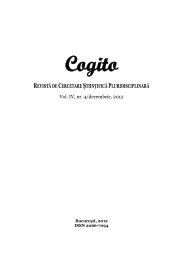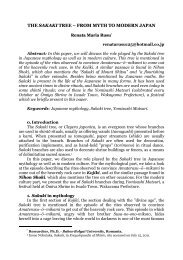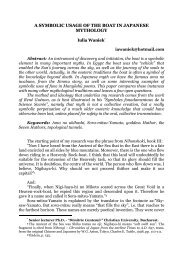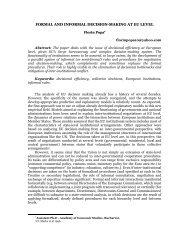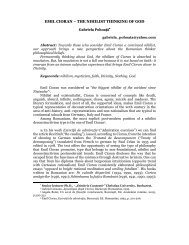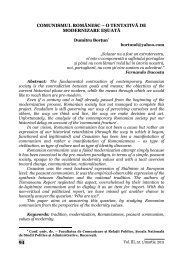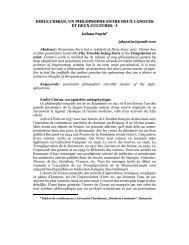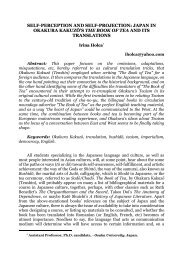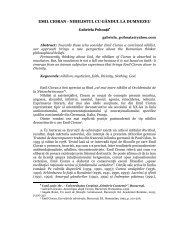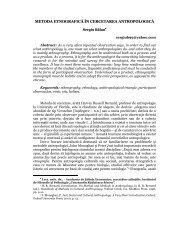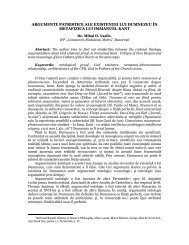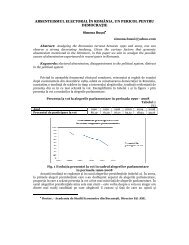logos` life from plato to the teachings of early christian doctrine - cogito
logos` life from plato to the teachings of early christian doctrine - cogito
logos` life from plato to the teachings of early christian doctrine - cogito
- No tags were found...
You also want an ePaper? Increase the reach of your titles
YUMPU automatically turns print PDFs into web optimized ePapers that Google loves.
LOGOS` LIFEFROM PLATO TO THE TEACHINGS OF EARLY CHRISTIANDOCTRINEMihai D. Vasile, Ph.DInstitute <strong>of</strong> Philosophy and Psychology „C.R. Motru”, Bucharestmdvasile@yahoo.comAbstract: Logos`<strong>doctrine</strong> as a line <strong>of</strong> force crosses <strong>the</strong> entire ancient Greekphilosophy and metaphysics as much as <strong>early</strong> Christianity. The tense problem isrelated <strong>to</strong> <strong>the</strong> <strong>life</strong> <strong>doctrine</strong> <strong>of</strong> Logos. Thus, for Pla<strong>to</strong>, <strong>the</strong> model (Logos) is also creativeDemiurge regarding being, goodness, rationality, and in terms <strong>of</strong> <strong>life</strong>, Logos is ageneric form and, as such, it is doubtful that Pla<strong>to</strong>’s Logos is <strong>life</strong> itself. In terms <strong>of</strong> basicChristian <strong>doctrine</strong>, it is clear that Logos is <strong>life</strong>. The question is <strong>to</strong> what extent ChristianLogos is comparable <strong>to</strong> <strong>the</strong> Pla<strong>to</strong>nic Logos.Keywords: Demiourgos, Pla<strong>to</strong>’s Logos, creation, Christ-Word, God, John’GospelLogos.In Pla<strong>to</strong>`s, Logos was sometimes a faculty or power (du/namij), by which Demiurgedesigned and ordered <strong>the</strong> Creation, sometimes, a matter <strong>of</strong> intellect (nou=j) function in<strong>the</strong> divine ideas pleroma and model for <strong>the</strong> sensitive world.Christian teaching about Logos is contained within <strong>the</strong> first 17 verses <strong>of</strong> <strong>the</strong> Gospel<strong>of</strong> John, which, in a simple and non-technical language, browse and decide allphilosophical controversies matters, at <strong>the</strong> fullness <strong>of</strong> time, such as eternal pre-existence,<strong>the</strong> personality and deity <strong>of</strong> Logos in <strong>the</strong> divine relations within The Holy Trinity, beforeCreation. Secondly, <strong>the</strong> Gospel <strong>of</strong> John establishes <strong>the</strong> divine Logos relations withCreation and man, before <strong>the</strong> Incarnation, Logos being called universal „<strong>life</strong>”, „truelight”, and „light <strong>of</strong> men” in a continuous process <strong>of</strong> bringing <strong>the</strong> world in<strong>to</strong> being.Thirdly, <strong>the</strong> same divine being, personal and eternal, is described as „being made flesh”,a condition in which He revealed Himself as God. In this lineage, <strong>the</strong> derived nature <strong>of</strong>His being and His divinity is suggested by <strong>the</strong> fact that He is <strong>the</strong> highest form <strong>of</strong>acquisition <strong>of</strong> <strong>the</strong> divine nature as Son <strong>of</strong> His Fa<strong>the</strong>r, which is also acquired being andequal in divinity with His origin.Anywhere <strong>the</strong> Gospel <strong>of</strong> John reached, a testimony appeared and removed anyobjections <strong>to</strong> His perfect deity, and any claim on <strong>the</strong> separate nature <strong>of</strong> Logos or on Hiscreated being in relationship with His Fa<strong>the</strong>r, but at <strong>the</strong> same time, <strong>the</strong> Symbol <strong>of</strong> faithcl<strong>early</strong> highlighted <strong>the</strong> individual personality <strong>of</strong> Logos. The language used <strong>to</strong> express <strong>the</strong>eternal personal distinction between Logos and Fa<strong>the</strong>r, though cl<strong>early</strong> and precisely atthat time, was <strong>the</strong> basis for <strong>the</strong> subsequent misunderstandings on <strong>the</strong> relationshipbetween Fa<strong>the</strong>r and Son as Logos. At <strong>the</strong> issue date <strong>of</strong> <strong>the</strong> Gospel <strong>of</strong> John, <strong>the</strong> Christian<strong>doctrine</strong> <strong>of</strong> Logos was not specified, even for Christian apologists and its application <strong>to</strong><strong>the</strong> person <strong>of</strong> Christ was hesitant. But beyond issues, accents, limitations ormisunderstandings, present in <strong>the</strong> writings <strong>of</strong> <strong>early</strong> Church Fa<strong>the</strong>rs, <strong>the</strong>re were beenseparated some key features <strong>of</strong> Christian <strong>doctrine</strong> about Logos.In <strong>the</strong> almost all comments <strong>from</strong> <strong>the</strong> first Christian centuries, <strong>the</strong> his<strong>to</strong>rical person<strong>of</strong> Jesus Christ was identified with <strong>the</strong> Logos. The reasoning was as follows: Jesus was<strong>the</strong> Logos or, at least, <strong>the</strong> Logos was Jesus. But given that dignity, Logos suggested easily- under <strong>the</strong> influence <strong>of</strong> Pla<strong>to</strong>nism - <strong>the</strong> idea <strong>of</strong> reason governed <strong>the</strong> universe, andbecause <strong>the</strong> person <strong>of</strong> Christ was treated as a perfect expression <strong>of</strong> <strong>the</strong> Logos, <strong>the</strong>re wasdanger <strong>of</strong> <strong>to</strong>o close or even exclusively link between Jesus and <strong>the</strong> universe assimilation
within <strong>the</strong> meaning <strong>of</strong> Christ's divine being as cosmic power. Of course it would be wrong<strong>to</strong> blame <strong>the</strong> Writers <strong>of</strong> <strong>the</strong> primary period - or at least apologists - making au<strong>the</strong>nticGospel <strong>of</strong> Christ in natural <strong>the</strong>ology as Christian writers <strong>of</strong> <strong>the</strong> first centuries tried <strong>to</strong> finda common language with that <strong>of</strong> <strong>the</strong> Greeks and Romans whose hostility intended <strong>to</strong>disarm, so <strong>the</strong>y naturally expressed <strong>the</strong> Logos <strong>doctrine</strong> in <strong>the</strong> form in which it can bemost easily received and unders<strong>to</strong>od. The apologists have pointed out that <strong>the</strong> position <strong>of</strong>Christ is <strong>the</strong> center <strong>of</strong> all beings, as confirming pre-Christian <strong>doctrine</strong>s, and, inparticular, Pla<strong>to</strong>nism.By <strong>the</strong> systematic <strong>the</strong>ology <strong>of</strong> Alexandria, many Church Fa<strong>the</strong>rs and writers havewritten about <strong>the</strong> identity <strong>of</strong> Jesus Christ and <strong>the</strong> divine Logos. Thus, St. IgnatiusTe<strong>of</strong>orul, in his epistles <strong>to</strong> Magnesians, Romans and Ephesians, calls him, althoughincidentally, Christ Logos and unique expression <strong>of</strong> God, "Fa<strong>the</strong>r mouth that speaks <strong>the</strong>truth" 1 . Diognet Epistle declares Logos – no serve, no angel, no prince, but - master andcrea<strong>to</strong>r <strong>of</strong> <strong>the</strong> universe, sent by <strong>the</strong> Almighty, through mercy and compassion, <strong>to</strong> save <strong>the</strong>world 2 . St. Justin Martyr and Philosopher is <strong>the</strong> first one, in Dialogue with <strong>the</strong> JewTryphon, who made a summary <strong>of</strong> <strong>the</strong> Logos names: Praise <strong>the</strong> Lord, <strong>the</strong> Son, Wisdom,Messenger, God, Lord, Word 3 . St. Justin, one can say that, started <strong>to</strong> build <strong>the</strong>cosmological aspect <strong>of</strong> <strong>the</strong> Logos <strong>doctrine</strong>, although ethical interest in terms <strong>of</strong>soteriological Christian teaching is equally strong. Theophilus <strong>of</strong> Antioch, in his Books <strong>to</strong>Au<strong>to</strong>lic, is <strong>the</strong> first <strong>to</strong> use <strong>the</strong> term „triad” in <strong>the</strong> sense <strong>of</strong> „Trinity” when addressing <strong>to</strong>God as "forseen Trinity", which includes but on God, His Word and His Wisdom 4 . InTheophilus is found also set out firstly <strong>the</strong> idea <strong>of</strong> continuous birth <strong>of</strong> Logos <strong>from</strong> Fa<strong>the</strong>r,through kønwsiV and continuous union <strong>of</strong> Fa<strong>the</strong>r with Logos as Fa<strong>the</strong>r's work in <strong>the</strong>world and among people, because <strong>the</strong> world cannot include Fa<strong>the</strong>r, but Logos can beinvolved in <strong>the</strong> world as „image” - pro/swpon is <strong>the</strong> term used by Theophilus – <strong>of</strong> Fa<strong>the</strong>r.Saint Irenaeus <strong>of</strong> Lugdunum is considered by Christian his<strong>to</strong>riography one <strong>of</strong> <strong>the</strong> mostremarkable <strong>early</strong> Church Fa<strong>the</strong>rs, because, among o<strong>the</strong>r things, his severe fight againstwea<strong>the</strong>r heresies in order <strong>to</strong> defend <strong>the</strong> purity <strong>of</strong> <strong>the</strong> truth <strong>of</strong> faith. Gnostic heresies ledhim <strong>to</strong> emphasize <strong>the</strong> idea <strong>of</strong> eternal coexistence <strong>of</strong> Logos with Fa<strong>the</strong>r in <strong>the</strong> person <strong>of</strong>Lord 5 , <strong>to</strong> combat <strong>the</strong> notion that <strong>the</strong> Logos was „done”, and <strong>to</strong> distinguish betweenmaking and generation (birth), rejecting any contingent <strong>doctrine</strong> <strong>to</strong> <strong>the</strong> fallout <strong>the</strong>ory asan expression <strong>of</strong> <strong>the</strong> relationship between Logos and Fa<strong>the</strong>r. Saint Irenaeus accepted <strong>the</strong>idea <strong>of</strong> <strong>the</strong> two generations (births), namely <strong>the</strong> birth <strong>from</strong> eternity through <strong>the</strong> godnessis both as <strong>the</strong> Fa<strong>the</strong>r and as <strong>the</strong> Son, and <strong>the</strong> birth in time by which <strong>the</strong> Son became man,and Logos is embodying and is thriving in <strong>the</strong> world, using <strong>the</strong> terms "Son" and "Logos"as synonyms. He conceived <strong>the</strong> Logos as <strong>the</strong> absolute <strong>to</strong>ol <strong>of</strong> <strong>the</strong> divine revelations for alltime, so that in <strong>the</strong>m not only God Himself, but Logos appears. Because <strong>of</strong> his righteousbelief, St. Irenaeus was far away <strong>from</strong> a type <strong>of</strong> subordination vision - quite normal at <strong>the</strong>time - but also because understanding <strong>the</strong> limitations <strong>of</strong> human consciousness inexploring <strong>the</strong> pr<strong>of</strong>ound nature <strong>of</strong> relations between Fa<strong>the</strong>r and Son, which is asuperbeing mystery. For Saint Irenaeus, Fa<strong>the</strong>r is God revealing Himself, and Son is Godrevealed, <strong>the</strong> same person with <strong>the</strong> Logos and Jesus Christ who is <strong>the</strong> Logos becamehuman person, so that <strong>the</strong> whole human race is again united with God and can attain <strong>the</strong>new divine incorruptibility: "Just <strong>to</strong> <strong>the</strong> extent that God does not need anything - Saint1St. Ignatius, To Romans, VIII.2Diognet Epistlet, VII. 1.3St. Justin Martyr and Philosopher, Dialogue with <strong>the</strong> Jew Tryphon, LXI.4Theophilus <strong>of</strong> Antioch, The second Book <strong>to</strong> Au<strong>to</strong>lic, XV.5Fr. Brune, (1992), Pour que l’homme devienne Dieu, 3e éd., St-Jean-de-Braye (France), ÉditionDangles, p. 402; p. 477–480.
Irenaeus says - man needs communion with God, so <strong>the</strong> glory <strong>of</strong> man is <strong>to</strong> preserve andcontinue <strong>the</strong> service <strong>of</strong> God" 6 .In Clement <strong>of</strong> Alexandria work, features <strong>of</strong> <strong>the</strong> Logos Christian <strong>doctrine</strong> appearcl<strong>early</strong>, in <strong>the</strong> details <strong>of</strong> <strong>the</strong> learning love, sympathy for intellectual activities, enthusiasmfor knowledge, all <strong>the</strong>se feelings regarded as <strong>the</strong> only path <strong>to</strong> <strong>the</strong> true interpretation <strong>of</strong><strong>the</strong> Gospel. No less sincere is recognizing <strong>the</strong> need for faith and love in search <strong>of</strong> truth,and desire <strong>to</strong> bring all humanity <strong>to</strong> hope in Christ, and <strong>to</strong> apply in any field <strong>of</strong> thoughtand action principles embodied in <strong>the</strong> <strong>life</strong> and <strong>teachings</strong> <strong>of</strong> Christ.Clement has transformed <strong>the</strong> idea <strong>of</strong> Logos - identified with Christ – in <strong>the</strong> highestreligious principle <strong>to</strong> explain <strong>the</strong> state <strong>of</strong> <strong>the</strong> world and <strong>to</strong> expose <strong>the</strong> Christian teaching,trying <strong>to</strong> build a <strong>the</strong>ological system on <strong>the</strong> idea <strong>of</strong> Logos as <strong>the</strong> beginning andfoundation 7. For Clement, <strong>the</strong> <strong>doctrine</strong> <strong>of</strong> Logos is concrete and productive: Logos is <strong>the</strong>crea<strong>to</strong>r <strong>of</strong> <strong>the</strong> universe and God revealed in <strong>the</strong> Old Testament Law, in <strong>the</strong> Greekphilosopher and, ultimately, in <strong>the</strong> fullness <strong>of</strong> time, through His incarnation, "that nosun can not look on <strong>the</strong> true God! It may do so only at saving Word, which is <strong>the</strong> Sun <strong>of</strong><strong>the</strong> soul, but He, when rises in <strong>the</strong> deep mind, enlightens <strong>the</strong> eyes <strong>of</strong> <strong>the</strong> soul ... Justthink and Pla<strong>to</strong>, when speaking <strong>of</strong> God covered with words like this: "All are around<strong>the</strong> emperor <strong>of</strong> <strong>the</strong> universe, He is <strong>the</strong> cause <strong>of</strong> all good" ... I know, Pla<strong>to</strong>, your teachers,although you want <strong>to</strong> hide! Geometry you learned <strong>from</strong> <strong>the</strong> Egyptians, astronomy <strong>from</strong>Babilonians, but <strong>the</strong> laws, those that are true, and worship <strong>to</strong> God, <strong>to</strong> <strong>the</strong> Jews youowe 8 .Logos forms, <strong>to</strong>ge<strong>the</strong>r with Fa<strong>the</strong>r and <strong>the</strong> Holy Spirit, <strong>the</strong> divine Trinity andthrough Logos man can know God, because Fa<strong>the</strong>r can not be expressed in words: "If <strong>the</strong>principle <strong>of</strong> anything is hard <strong>to</strong> find, <strong>the</strong> harder it is <strong>to</strong> show first and <strong>the</strong> old principle,which is cause <strong>to</strong> birth and continued existence <strong>of</strong> all things. How could speak <strong>of</strong> OneWho is nei<strong>the</strong>r kind nor difference, nor species, no individual, no number, no accident,nor anything subject under accident? You can not call in any way as "all", because"everything" is ruled in order size, and God is <strong>the</strong> Fa<strong>the</strong>r <strong>of</strong> all. You should not speak <strong>of</strong>parts <strong>of</strong> God, that one is indivisible, so is <strong>the</strong> infinite, not that you can not browse, butin that it is dimensionless and has no end, and <strong>the</strong>refore is not form and no name. Givewe God a name, <strong>the</strong>n name it is not proper, or call it One, or Good, or lying, or veryexistence, or God, or Crea<strong>to</strong>r, or Lord, not his name <strong>the</strong>m as name <strong>of</strong> God, but because<strong>of</strong> where we find embarrassment, use beautiful names for God, for our minds <strong>to</strong> rest on<strong>the</strong>m and not wander about o<strong>the</strong>r appointments. Each <strong>of</strong> <strong>the</strong>se names, takenseparately, do not reveal God's being, but all <strong>of</strong> <strong>the</strong>m show <strong>the</strong> power <strong>of</strong> <strong>the</strong> Almighty;that names we give <strong>to</strong> God are, or words <strong>to</strong> show us His attributes, or words that showrelationships between <strong>the</strong>m; but none <strong>of</strong> <strong>the</strong>m tell us what God is. But we can notacquire through apodeictic science something about God, this science is based onprevious knowledge, <strong>the</strong> knowledge that we are better known. The Unborn but before<strong>the</strong>re is nothing! It remains, <strong>the</strong>refore, that only by divine grace and only by Wordborn <strong>of</strong> Him we know The Unknown 9 .Clement states and refined Pla<strong>to</strong>nic <strong>doctrine</strong> <strong>of</strong> Logos in <strong>the</strong> sense that Logos, asdivine reason is, essentially, <strong>the</strong> world teacher and legisla<strong>to</strong>r <strong>of</strong> mankind, but as <strong>the</strong>embodiment in <strong>the</strong> person <strong>of</strong> Jesus Christ, <strong>the</strong> Logos is also <strong>the</strong> savior <strong>of</strong> <strong>the</strong> human raceand <strong>the</strong> founder a new <strong>life</strong> that begins with faith, through knowledge and contemplationand lead, through love and compassion, <strong>to</strong> immortality and deification. Christ, <strong>the</strong>6Saint Irenaeus, Adversus Haereses, IV, 25, 1.7Eugène de Faye, (1898), Clément d’Alexandrie. Étude sur les rapports du Christianisme et de laPhilosophie grecque au IIe siècle, Paris, Ernest Leroux, Éditeur, p. 240 sq.8Clemens o Alexandreus, Protreptikos, VI, 68. 4. – 70. 19Clemens o Alexandreus, Stromata, V, XII, 81. 4 – 82. 4.
Incarnate Logos, is God and man, and only through him people can rise <strong>to</strong> divine <strong>life</strong>.Therefore it is said <strong>of</strong> Christ that He is <strong>the</strong> sun <strong>of</strong> justice: "Light, cleaner than sunlight,we shone <strong>from</strong> heaven <strong>to</strong> us those who were buried in darkness and locked in <strong>the</strong>shadow <strong>of</strong> death. Light that is eternal light and all things involved in living light live.These will say <strong>the</strong> words: "new make". "Sun <strong>of</strong> justice" crosses equally <strong>the</strong> wholemankind, imitating his Fa<strong>the</strong>r, Who, "rises His sun over all men" and wet with truthdew <strong>the</strong> whole mankind, with <strong>the</strong> true faith dew. The sun, by His crucifixion, hadturned death in<strong>to</strong> <strong>life</strong>. He proclaimed <strong>the</strong> good, waked up <strong>the</strong> people <strong>to</strong> work <strong>the</strong> goodand reminds <strong>the</strong>m true <strong>life</strong>, giving us <strong>the</strong> legacy <strong>the</strong> really great, divine, that nobodycan take <strong>from</strong> us. Through His heavenly teaching He deifies man "laws giving in <strong>the</strong>people's hearts and write <strong>the</strong>m in <strong>the</strong>ir hearts" 10 .Christian teaching is - after Clement - <strong>the</strong> revealed Word <strong>of</strong> God about creation,training and salvation <strong>of</strong> humankind through <strong>the</strong> incarnate Logos, whose workculminates in <strong>the</strong> knowledge (gnosis), perfectly unders<strong>to</strong>od by Clement as trueknowledge <strong>of</strong> God, that can be gained only through <strong>the</strong> reason disciplined by love andjustice, in order <strong>to</strong> reach rational <strong>the</strong>ology after going through alegorism 11. The <strong>doctrine</strong><strong>of</strong> Logos becomes <strong>the</strong> center and source <strong>of</strong> all <strong>of</strong> Clement's <strong>the</strong>ological system.Logos never existed outside <strong>the</strong> Fa<strong>the</strong>r but is <strong>from</strong> eternity with Fa<strong>the</strong>r, and, as Son,<strong>the</strong> Logos is <strong>the</strong> beginning <strong>of</strong> <strong>the</strong> founder, cause or principle <strong>of</strong> all things that are as <strong>the</strong>yare, He Himself being without beginning. He is <strong>the</strong> crea<strong>to</strong>r <strong>of</strong> <strong>the</strong> world, <strong>the</strong> source <strong>of</strong>light and <strong>life</strong>, in a sense that he is beginning <strong>of</strong> <strong>the</strong> created beings series, but due <strong>to</strong> hisdivine being, in a specifically different way <strong>from</strong> each o<strong>the</strong>r. He is <strong>the</strong> interpreter <strong>of</strong> <strong>the</strong>Fa<strong>the</strong>r attributes, <strong>the</strong> personal expression <strong>of</strong> truth, educa<strong>to</strong>r <strong>of</strong> <strong>the</strong> human race - <strong>of</strong> <strong>the</strong>Greeks through philosophy, <strong>of</strong> <strong>the</strong> Jews by law, and, after <strong>the</strong> Incarnation in Christ, <strong>of</strong> allthose who by faith receive His teaching, <strong>to</strong>wards knowledge, and <strong>from</strong> knowledge <strong>to</strong> love,and <strong>from</strong> love <strong>to</strong> <strong>the</strong> "inheritance <strong>of</strong> <strong>the</strong> kingdom <strong>of</strong> Fa<strong>the</strong>r".Clement supported without hesitation <strong>the</strong> distinction between Fa<strong>the</strong>r and Logos,such that <strong>the</strong> real problem <strong>to</strong> be solved in connection with Clement's <strong>doctrine</strong> aboutLogos, is <strong>to</strong> ascertain whe<strong>the</strong>r Clement distinguish between Logos as primary existent,and Logos as <strong>the</strong> Son <strong>of</strong> <strong>the</strong> Fa<strong>the</strong>r, thinking as two persons, namely, <strong>the</strong> Logos Itself,immutable and unalterable in God (<strong>the</strong> immanent Logos), on <strong>the</strong> one hand, and on <strong>the</strong>o<strong>the</strong>r hand, <strong>the</strong> emanation <strong>of</strong> <strong>the</strong> Logos-Son <strong>of</strong> God <strong>from</strong> <strong>the</strong> immanent reason (Logosjustified through creative action). Eusebius, in his Church His<strong>to</strong>ry, says that aboutClement is said <strong>to</strong> be writing Hypotyposeis, where <strong>the</strong> Logos-Son is called with <strong>the</strong> samename as <strong>the</strong> Logos <strong>of</strong> <strong>the</strong> Fa<strong>the</strong>r, but He does not incarnate nor <strong>the</strong> Logos <strong>of</strong> <strong>the</strong> Fa<strong>the</strong>r,but a certain power <strong>of</strong> God, as such a flow <strong>from</strong> <strong>the</strong> Logos himself who became thoughtand continuously deviates on <strong>the</strong> people's hearts. This is <strong>the</strong> only place where Clementmade such a distinction, and its real significance is obscure, and, outside his text - lost, infact - it is impossible <strong>to</strong> use in support <strong>of</strong> any opinion contrary <strong>to</strong> <strong>the</strong> whole conception <strong>of</strong>Clement`s great trilogy about Logos - one and <strong>the</strong> same <strong>from</strong> beginning <strong>to</strong> <strong>the</strong> end <strong>of</strong> <strong>the</strong>things - that directs people <strong>to</strong> <strong>the</strong> faith, teaching <strong>the</strong>m, and, ultimately, bringing <strong>the</strong>perfect knowledge <strong>of</strong> God. Moreover, in Stromata (V, 1. 1-5.), Clement objects in using<strong>the</strong> term Logos Pr<strong>of</strong>orikos (Lo/goj pr<strong>of</strong>oriko/j) <strong>to</strong> denote <strong>the</strong> Son, on <strong>the</strong> grounds thatdevalues <strong>the</strong> dignity <strong>of</strong> <strong>the</strong> Son, and not heeding <strong>the</strong> distinction between LogosEndia<strong>the</strong><strong>to</strong>s (Lo/goj e)ndia/qe<strong>to</strong>j), as <strong>the</strong> highest Logos, and Logos Pr<strong>of</strong>orikos (Lo/gojpr<strong>of</strong>oriko/j), as <strong>the</strong> Logos below, as <strong>the</strong>re was a tendency in some Christian philosophersmore rudimentary - as Theophilus <strong>of</strong> Antioch and Tertullian - (or influenced by Pla<strong>to</strong>), <strong>to</strong>distinguish between <strong>the</strong> unspoken Logos and <strong>the</strong> spoken Logos, in order <strong>to</strong> identify <strong>the</strong>10Clemens o Alexandreus, Protreptikos, XI, 114. 1.–4.11Ch. Bigg, (1913), The Christian Pla<strong>to</strong>nists <strong>of</strong> Alexandria, Oxford, At <strong>the</strong> Clarendon Press,p. 115–119.
Son as <strong>the</strong> divine Reason, with <strong>the</strong> Logos immanent in <strong>the</strong> mind <strong>of</strong> <strong>the</strong> Fa<strong>the</strong>r, and with<strong>the</strong> hypostasis <strong>of</strong> <strong>the</strong> Son as creation instrument 12 . As with o<strong>the</strong>r similar controversial<strong>the</strong>ology places <strong>of</strong> Clement, <strong>the</strong> only type <strong>of</strong> criticism is a judicious interpretation <strong>of</strong> <strong>the</strong>less known about <strong>the</strong> precise formulated statements, so that questionable expressionsmust be reported <strong>to</strong> <strong>the</strong> entire work <strong>of</strong> <strong>the</strong> author.General concept <strong>of</strong> Clement was cl<strong>early</strong> expressed in <strong>the</strong> <strong>doctrine</strong> <strong>of</strong> Logos as <strong>the</strong>eternal Son equal, but distinct <strong>from</strong> Fa<strong>the</strong>r, manifested throughout human his<strong>to</strong>ry and,ultimately, <strong>to</strong> incarnate in <strong>the</strong> person <strong>of</strong> Jesus Christ. Clement says cl<strong>early</strong> in <strong>the</strong> decisivewords <strong>of</strong> <strong>the</strong> Protreptikos` prologue: "because <strong>the</strong> Word was <strong>from</strong> <strong>the</strong> beginning, so <strong>the</strong>Word was and is divine beginning <strong>of</strong> all existences; and that for now He receivedname, <strong>the</strong> name <strong>of</strong> Christ - as enshrined in <strong>the</strong> old name, name worthy <strong>of</strong> power - so Icalled Him new Song. The Word, Christ, is <strong>the</strong> cause <strong>of</strong> our existence in olden times -that He was in God - and our existing good - now that He was shown between people -<strong>the</strong> Word itself, which is one and only o<strong>the</strong>r - and God and man - because all goodthings. Learning <strong>from</strong> Him <strong>to</strong> lead a good existence, we are led <strong>to</strong> eternal <strong>life</strong>” 13 .Clement writes uplifting words <strong>of</strong> glory at Christ and His work in full training peopleeternal <strong>life</strong> in a completely orthodox dogmatic note 14 . Alexandreus put words calling <strong>to</strong>salvation in Jesus's mouth, stating for <strong>the</strong> first time in a simplified form, <strong>the</strong> dictum <strong>of</strong><strong>the</strong> Church Fa<strong>the</strong>rs long career in <strong>the</strong>ology, namely that God became man so that man <strong>to</strong>deify: "Therefore you will be said by Lord Himself, "Who, being face <strong>of</strong> God, notconsidered <strong>to</strong> be an abduction <strong>to</strong> be just with God but emptied Himself was" mercifulGod, desiring long <strong>to</strong> save <strong>the</strong> man. Word Himself prompts you very cl<strong>early</strong> now,making you redden <strong>of</strong> your disbelief, yes, I say, <strong>the</strong> Word <strong>of</strong> God became man, so you're<strong>the</strong> man, that man can reach God” 15 .There are numerous references in <strong>the</strong> text <strong>of</strong> Clement, concerning <strong>the</strong> fact that <strong>the</strong>Son is working "by <strong>the</strong> will" and "in accordance with <strong>the</strong> will <strong>of</strong> Fa<strong>the</strong>r, in order <strong>to</strong>preserve <strong>the</strong> Fa<strong>the</strong>r`s authority, not <strong>to</strong> limit <strong>the</strong> power <strong>of</strong> <strong>the</strong> Son. Such statements donot imply any idea <strong>of</strong> inferiority or subordination <strong>of</strong> <strong>the</strong> Son <strong>to</strong> <strong>the</strong> Fa<strong>the</strong>r, but areintended <strong>to</strong> express <strong>the</strong> overall harmony <strong>of</strong> <strong>the</strong> Fa<strong>the</strong>r and <strong>the</strong> Son and <strong>to</strong> excludeGnostic dualism, and any sentence able <strong>to</strong> disturb <strong>the</strong> unity between <strong>the</strong> divine beings,who do not allowed temporal sequence or <strong>the</strong> Son's procession <strong>from</strong> any o<strong>the</strong>r causethan <strong>the</strong> very essence <strong>of</strong> divinity 16 .To argue <strong>the</strong> identity <strong>of</strong> <strong>the</strong> Fa<strong>the</strong>r and <strong>the</strong> Son, Clement used a Pla<strong>to</strong>nicterminology, which takes pleroma ideas as <strong>the</strong> medium. Thus, in one passage, Clementsays: "Mind (nou=j) is home ideas and mind (nou=j) is God" 17 , adding that only Christlooks directly in<strong>to</strong> <strong>the</strong> world <strong>of</strong> ideas <strong>to</strong> fulfil God's will, although "it is difficult <strong>to</strong> achieveGod's place, which Pla<strong>to</strong> called <strong>the</strong> place <strong>of</strong> ideas ... a place that embraces all and <strong>the</strong>universe ... <strong>to</strong> grasp with your mind (νο×ς) itself <strong>the</strong> good in itself and thus achieve itsaim <strong>of</strong> thinking” 18 .In ano<strong>the</strong>r passage, referring <strong>to</strong> <strong>the</strong> Christian Logos, Clement summarizes <strong>the</strong> wholeChristian <strong>doctrine</strong>, as <strong>the</strong> catechesis model <strong>of</strong> St. Peter's Pentecost and <strong>the</strong> relationship<strong>of</strong> Christianity with Pla<strong>to</strong>nism and Judaism when practicing: "Word <strong>of</strong> God said: "I amtruth", so <strong>the</strong> Word <strong>of</strong> God <strong>to</strong> be seen with <strong>the</strong> mind. "For who be called truephilosophers? For those, I say, who like <strong>to</strong> contemplate <strong>the</strong> truth!". In <strong>the</strong> Phaidros12Ch. Bigg, (1913), The Christian Pla<strong>to</strong>nists <strong>of</strong> Alexandria, Oxford, At <strong>the</strong> Clarendon Press, p. 90.13Clemens o Alexandreus, Protreptikos, I, 6.5. – 7.1.14Ibidem, 7.3.15Ibidem, 8.4.16Ch. Stead, (1994), Philosophy in Christian Antiquity, Cambridge, At <strong>the</strong> University Press, p. 189.17Clemens o Alexandreus, Stromata, IV, XXV, 155.2.18Ibidem, V, XI, 73.3 – 74.2., p. 353.
dialogue, Pla<strong>to</strong> said that talk <strong>of</strong> truth as about an idea. And <strong>the</strong> idea is God` s thoughtthat barbarians ["Jews"] named him <strong>the</strong> word <strong>of</strong> God. Textual, Pla<strong>to</strong> says <strong>the</strong>se: "be,but <strong>to</strong> dare <strong>to</strong> speak <strong>the</strong> truth, especially when it comes <strong>to</strong> truth. That <strong>the</strong> real essence <strong>of</strong>soul, which is colourless, shapeless and without possibility <strong>to</strong> be achieved, it looks only<strong>to</strong> <strong>the</strong> mind, leading its soul." When <strong>the</strong> Word went out in <strong>the</strong> world, He was <strong>the</strong> cause<strong>of</strong> creation; <strong>the</strong>n, Himself was born, <strong>the</strong> Word was made flesh, that may becontemplated” 19 .H. A. Wolfson believes that in its catechesis, Clement made two identifications 20 ,namely: <strong>the</strong> first, Clement identifies <strong>the</strong> Christian Logos <strong>from</strong> <strong>the</strong> Gospel <strong>of</strong> John withFilon's Jewish Logos, and distinguishes two stages <strong>of</strong> existence <strong>of</strong> <strong>the</strong> Logos; firstly,before out in <strong>the</strong> world <strong>to</strong> create it, <strong>the</strong> Logos was only a thought <strong>of</strong> God, and <strong>the</strong>n, afterHe got out <strong>of</strong> God and created world, <strong>the</strong> Logos became a distinct personal being.Clement actually performs a third identification when claims that "<strong>the</strong> Logos was madeflesh and dwelt among us for a while witty and truth" in <strong>the</strong> his<strong>to</strong>rical person <strong>of</strong> JesusChrist.In <strong>the</strong> second identification, however, Clement equate Logos and truth by arguing areference <strong>to</strong> Pla<strong>to</strong>'s dialogue Phaidros. And as Pla<strong>to</strong> speaks about <strong>the</strong> truth, not in <strong>the</strong>idea <strong>of</strong> truth, but really understanding <strong>the</strong> truth as ideal, as <strong>the</strong> whole paradigm <strong>of</strong> ideas,and <strong>the</strong> private truths <strong>of</strong> <strong>the</strong> world - and in Philebos (59 C) and Republic (IX, 585 c),Pla<strong>to</strong> called <strong>the</strong> truth as a fundamental property <strong>of</strong> all ideas - Christian Logos isdescribed by Clement as truth that includes all ideas. Also in Stromata 21 , Clement uses<strong>the</strong> term "intelligible world" describing it in line with <strong>the</strong> Pla<strong>to</strong>nic <strong>doctrine</strong> <strong>of</strong> separation<strong>of</strong> <strong>the</strong>se two worlds - that <strong>of</strong> essences, separated <strong>from</strong> <strong>the</strong> world <strong>of</strong> appearances or <strong>the</strong>shadows: "barbarian philosophy knows a different world, spiritual and materialworld; one, <strong>the</strong> original, different, and o<strong>the</strong>r, face <strong>of</strong> so-called model; one leading <strong>to</strong> <strong>the</strong>monad, as it is spiritual; <strong>the</strong> o<strong>the</strong>r, <strong>the</strong> material leads <strong>to</strong> exad. In <strong>the</strong> monad <strong>the</strong> sky isunseen, faceless earth and spiritual light”. But Clement's goal is <strong>to</strong> highlight <strong>the</strong>similarity between Pla<strong>to</strong>'s <strong>doctrine</strong> <strong>of</strong> creation and biblical essay <strong>of</strong> Creation, ascontinuing with quotations <strong>from</strong> Scripture: "Scripture says:" in <strong>the</strong> beginning Godcreated heaven and earth, <strong>the</strong> earth was invisible. "Then added: "And God said <strong>to</strong> belight, and was light" ... Did not find, really, that <strong>from</strong> <strong>the</strong>se words <strong>of</strong> Scripture Pla<strong>to</strong><strong>to</strong>ok his <strong>doctrine</strong> when he left <strong>the</strong> ideas <strong>of</strong> living beings in <strong>the</strong> spiritual world and in thisworld has <strong>the</strong> material forms, created by <strong>the</strong> spiritual genre?”. Thus, Clementinterprets in <strong>the</strong> Christian sense <strong>the</strong> first day <strong>of</strong> creation through <strong>the</strong> Logos, referring <strong>to</strong><strong>the</strong> intelligible world creation mentioning three <strong>of</strong> <strong>the</strong> seven stages <strong>of</strong> creation afterPla<strong>to</strong>, namely, "<strong>the</strong> invisible heavens", <strong>the</strong> earth unseen (or holy), and "intellectual light".Referring <strong>to</strong> Pla<strong>to</strong>'s description <strong>of</strong> <strong>the</strong> ideal paradigm <strong>of</strong> <strong>the</strong> visible world is continued byClement describing <strong>the</strong> four living beings in <strong>the</strong> material world, called intelligent souls.By putting <strong>to</strong>ge<strong>the</strong>r passages in which Clement speaks <strong>of</strong> God, <strong>the</strong> Logos and <strong>the</strong>world <strong>of</strong> ideas, it follows a consistent <strong>doctrine</strong> <strong>of</strong> Christian Logos 22 . So, ideas areintelligible world that is contained in <strong>the</strong> Christian Logos as <strong>the</strong> house. Christian Logoshas two stages <strong>of</strong> evolution. In <strong>the</strong> first stage, <strong>the</strong> Logos is <strong>the</strong> same with God, and in <strong>the</strong>second stage - <strong>the</strong> stage <strong>of</strong> creation <strong>of</strong> <strong>the</strong> world, "heaven and earth" <strong>from</strong> Scripture -Logos becomes a spiritual being, but personal and distinct. In turn, <strong>the</strong> ideas containedin <strong>the</strong> Logos, were also in two stages <strong>of</strong> existence, namely in Logos as <strong>the</strong> core reason,19Ibidem, V, III, 16.1.–5., p. 319–320.20H.A. Wolfson, (1956), The Philosophy <strong>of</strong> Church Fa<strong>the</strong>rs, vol. I, Cambridge, Massachusetts, HarvardUniversity Press, p. 268.21Clemens o Alexandreus, Stromata, V, XIV, 93.4 – 9.4.2.22R.M. Grant, (1986), Gods and <strong>the</strong> One God, Philadelphia, Pennsylvania, The Westminster Press, p.90–91.
and in <strong>the</strong> visible world as shadows or "faces" - "seed" St. Maximus <strong>the</strong> Confessor will tell- built-in objects <strong>of</strong> <strong>the</strong> visible world. Clement acknowledges that one <strong>of</strong> <strong>the</strong> sources <strong>of</strong>his <strong>doctrine</strong> is "barbarian philosophy" <strong>of</strong> Pla<strong>to</strong>, and more specifically, <strong>the</strong> <strong>the</strong>ory <strong>of</strong>Pla<strong>to</strong>nic ideas. Gospel <strong>of</strong> John, considered <strong>the</strong> essence <strong>of</strong> his <strong>doctrine</strong> about Logos, isClement's argument as <strong>the</strong> basis <strong>of</strong> <strong>the</strong> fact that <strong>the</strong> Logos, even in <strong>the</strong> second stage <strong>of</strong>His becoming, is God. And <strong>the</strong> fact, that <strong>the</strong> incarnate Logos in <strong>the</strong> his<strong>to</strong>rical person <strong>of</strong>Jesus Christ is God, needs no demonstration because it is proved cl<strong>early</strong> andundoubtedly, by <strong>the</strong> Gospel <strong>of</strong> John.Origenes continues, but refined <strong>to</strong> Clement about <strong>the</strong> Christian Logos <strong>doctrine</strong>,relying on Christ's statement "I am not <strong>of</strong> this world" (John 8:23), and "My kingdom isnot <strong>of</strong> this world" (John 18:36). In this sense, Origenes distinguishes between a false<strong>the</strong>ory <strong>of</strong> ideas - <strong>to</strong> have a reject - and <strong>the</strong> true <strong>the</strong>ory <strong>of</strong> ideas, <strong>to</strong> be developing: "Ipointed <strong>the</strong> weight <strong>to</strong> indicate that this world is, that does not get anyone <strong>to</strong> believe thatthus affirm <strong>the</strong> existence <strong>of</strong> simple images (εÀκÍνeς τÂνeς), which <strong>the</strong> Greeks call <strong>the</strong>m"ideas"” 23 . As it can be seen, Origenes considers false <strong>the</strong> <strong>pla<strong>to</strong></strong>nic <strong>the</strong>ory <strong>of</strong> ideas, or atmost, an instrument which is used <strong>to</strong> express <strong>the</strong> Savior`s true <strong>doctrine</strong> <strong>of</strong> ideas which is<strong>the</strong> Christian teaching as "something more beautiful and grand”.H.A. Wolfson considers 24 - unlike o<strong>the</strong>r exegetes <strong>of</strong> Origenes - that <strong>the</strong> passage wasnot corrected by Rufin under <strong>the</strong> influence <strong>of</strong> Latin tradition represented by Cicero andSeneca, but plays exactly <strong>the</strong> nuances <strong>of</strong> origenist thought that distinguishes amongi)de/ai, ei)ko/nej and fantasi/ai, in order <strong>to</strong> play Filon <strong>of</strong> Alexandria distinction that madeit among <strong>the</strong> "bodily images" (Àδøαι), "non-bodily images" (εÀκÍνες …σàµατoι) and"visible images" (Ìρατα εÀκÍνες). Filon's distinction was regarded by Origenes muchcloser <strong>to</strong> <strong>the</strong> spirit <strong>of</strong> <strong>the</strong> Gospel than Pla<strong>to</strong>'s "cut" between <strong>the</strong> world <strong>of</strong> sensitive andintelligible world - in fact Pla<strong>to</strong> did not consider anywhere "ideas" as "images" – due <strong>to</strong><strong>the</strong> fact that <strong>the</strong> description <strong>of</strong> <strong>the</strong> Son-Logos as "visible image <strong>of</strong> <strong>the</strong> invisible God”, inPeri Archõn (I, 2, VI), is directly based on <strong>the</strong> words <strong>of</strong> <strong>the</strong> Apostle: „<strong>the</strong> face (ei)kw/n) <strong>of</strong><strong>the</strong> invisible God (a)o/ra<strong>to</strong>n)” (Colossians, 1:15). „Face” (ei)kw/n), which had not yet seen,is <strong>the</strong> image <strong>of</strong> God as Logos, as it was unders<strong>to</strong>od by Filon and Clement <strong>of</strong> Alexandria 25 ,<strong>the</strong> image <strong>of</strong> <strong>the</strong> Son consubstantial with <strong>the</strong> Fa<strong>the</strong>r and accomplishing His will.For Origenes, <strong>the</strong> term "images" (ei)ko/nej), and <strong>the</strong> words "powers" (du/nameij) and"virtues" (a)retai/), are in terms <strong>of</strong> Scripture, equivalent <strong>to</strong> <strong>the</strong> Pla<strong>to</strong>nic term „ideas”(i)de/ai) in terms <strong>of</strong> existing reasons in Demiurge`s Logos, and <strong>the</strong>refore, Origenesrightly states on Logos quality <strong>of</strong> „face” (ei)kw/n) <strong>of</strong> <strong>the</strong> Fa<strong>the</strong>r that is <strong>the</strong> unseen (<strong>to</strong>\a)o/ra<strong>to</strong>n), as Pla<strong>to</strong> calls it <strong>the</strong> non-bodily (<strong>to</strong>\ a)so/ma<strong>to</strong>n), in order <strong>to</strong> bring <strong>the</strong> trueveneration <strong>to</strong> God 26 . In <strong>the</strong> Preface <strong>to</strong> Peri Archõn, Origenes proposes "<strong>to</strong> examine,however, whe<strong>the</strong>r <strong>the</strong> notion that Greek philosophers call … a)so/ma<strong>to</strong>j, i.e. „nonbodily”are somehow under a different name in Scripture. Firstly, we have <strong>to</strong> see how <strong>to</strong>design even God Himself, if he has or not <strong>the</strong> body, whe<strong>the</strong>r or not he has any one seenlook, if He has in particular any (seen) state or if more than flesh. Origenes rejects <strong>the</strong>common interpretation <strong>of</strong> <strong>the</strong> ideas world <strong>of</strong> Logos as fantasies <strong>of</strong> <strong>the</strong> mind designed inheaven and having reality: "It is quite strange <strong>to</strong> our way <strong>of</strong> thinking <strong>to</strong> suggest <strong>the</strong>existence <strong>of</strong> a non-bodily world, with no consistency only in <strong>the</strong> imagination and in <strong>the</strong>slippery realm <strong>of</strong> opinions (fantasi/ai) 27 . Origenes` statement is very clear in considering23Origenes, Peri Archõn, II, 3, VI.24H. A. Wolfson, (1956), The Philosophy <strong>of</strong> Church Fa<strong>the</strong>rs, vol. I, Cambridge, Massachusetts, HarvardUniversity Press, p. 270–271.25Clemens o Alexandreus, Protreptikos, X, 98.4.26Origenes, Philocalia seu Ecloga de operibus Origenis a Basilio et Gregorio Nazianzeno facta, XVII,6.27Origenes, Peri Archõn, II, 3, VI.
Pla<strong>to</strong>nic world <strong>of</strong> ideas - as it is vulgarly unders<strong>to</strong>od - <strong>to</strong> have existence only in <strong>the</strong>human mind as pure fantasy or fleeting thought.Origenes is not related <strong>to</strong> <strong>the</strong> original <strong>the</strong>ory when it rejected Pla<strong>to</strong>nic <strong>doctrine</strong> <strong>of</strong>ideas as <strong>the</strong>re are seats <strong>to</strong> prove knowledge <strong>of</strong> Origenes that Pla<strong>to</strong> assumed that ideas aresubstances (ou)si/ai), separated <strong>from</strong> matter, having a real existence as thought (ou)si/ai)<strong>of</strong> God (Demiurge). For Origenes also, "ideas" <strong>of</strong> Pla<strong>to</strong> were thoughts (dia/noiai) <strong>of</strong> Godthat God used <strong>the</strong>m as models (ei)kono/smata) <strong>to</strong> create all things. At <strong>the</strong> same time,Origenes brought a new vision on <strong>the</strong> Logos including ideas pleroma, when hedistinguished betweenideas as God's thoughts, and <strong>the</strong> thoughts <strong>of</strong> people as merefantasies about <strong>the</strong> world <strong>of</strong> ideas, as Pla<strong>to</strong> himself suggestion in <strong>the</strong> dialogueParmenides (132 b - c), where Socrates abandons <strong>the</strong> assumption that ideas are only insouls (e)n yuxa/j) <strong>of</strong> people, and not in <strong>the</strong> mind (Logos) <strong>of</strong> God (Demiurge). WhatOrigenes adds, however, makes <strong>the</strong> difference both <strong>from</strong> gregarious concepts about <strong>the</strong>world <strong>of</strong> ideas, and <strong>to</strong> <strong>the</strong> Pla<strong>to</strong>nic <strong>the</strong>ory <strong>of</strong> ideas, meaning that none <strong>of</strong> <strong>the</strong>interpretations can be identified or equated with <strong>the</strong> world where Jesus Christ came<strong>from</strong> through <strong>the</strong> incarnation, and <strong>to</strong> which <strong>the</strong> needy saints <strong>to</strong> come: „that is why I seenot how it might say that <strong>the</strong> Savior proceed <strong>from</strong> <strong>the</strong>re, or that <strong>the</strong> apostles wouldswitch in <strong>the</strong>re. There is no doubt that <strong>the</strong> Savior teaches us something much greaterand more beautiful than this world and that in <strong>the</strong>re calls and urges all who believe inHim, <strong>to</strong> turn <strong>the</strong>ir aspirations” 28 .And although Origenes rejects <strong>the</strong> existential interpretation <strong>of</strong> imaginary worlds <strong>of</strong><strong>the</strong> vulgar ideas <strong>the</strong>ory, or thought in <strong>the</strong> Pla<strong>to</strong> way, he does not deny <strong>the</strong> real existence<strong>of</strong> ano<strong>the</strong>r world where Christ has arrived <strong>from</strong>, and <strong>the</strong> saints go <strong>to</strong>, treated as <strong>the</strong> worldabout which Scripture says: „In <strong>the</strong> beginning God created <strong>the</strong> heavens and <strong>the</strong> earth”(Genesis 1:1)”. Origenes states that <strong>the</strong> words <strong>of</strong> Genesis, "designate ano<strong>the</strong>r heaven andearth than <strong>the</strong> dome <strong>of</strong> heaven, which have been made - as <strong>the</strong> Scriptures say - in twodays afterwards, and <strong>the</strong> land was later called „earth”" 29 . Primordial heavens and <strong>the</strong>earth - <strong>to</strong> be res<strong>to</strong>red in <strong>the</strong> whole universe at God’s parousia - are - Origenes added in<strong>the</strong> <strong>pla<strong>to</strong></strong>nic way – „that heaven and earth in that <strong>the</strong>y have borrowed <strong>the</strong> name <strong>of</strong> <strong>the</strong>heavens and <strong>the</strong> land we see” 30 , i.e., <strong>the</strong>re is <strong>the</strong> ideal earth and <strong>the</strong> heaven as aspecimen <strong>of</strong> which were made by imitation, visible sky and land. Ideal world, <strong>of</strong> whichChrist came down, is described by Origenes <strong>to</strong> be inhabited, actually, for some idealbeings, saints, eternal Law and Gospel, <strong>to</strong> which <strong>the</strong> Law <strong>of</strong> Moses is "copy and shadow"(Hebrew, 8:3): „this is outlet heaven and earth and rest <strong>of</strong> <strong>the</strong> faithful, and <strong>of</strong> <strong>the</strong>se, <strong>the</strong>first will be <strong>the</strong> saints, and "<strong>the</strong> meek" <strong>of</strong> this "land" <strong>the</strong>y will inherit, because Lawteaches so, and <strong>the</strong> Prophets and <strong>the</strong> Gospel. In this "earth", I think, <strong>the</strong>y will find trueand living patterns <strong>of</strong> those prescriptions that He gave <strong>the</strong>m as "face and shadow <strong>of</strong> <strong>the</strong>heavenly" ... They will learn here what is called "eternal gospel" and that eternal "NewTestament", which will never grow old” 31 . Elsewhere, Origenes is more trenchant whenhe says: "What <strong>the</strong> Holy Scriptures have named „<strong>the</strong> land <strong>of</strong> <strong>the</strong> good”, we believe that a"country <strong>of</strong> <strong>the</strong> living"; it has as "heaven" that I mentioned above and, after <strong>the</strong> word <strong>of</strong>Christ, <strong>the</strong>re are written or were written <strong>the</strong> names <strong>of</strong> saints and that close and hugthis earth, which <strong>the</strong> Savior promised in His Gospel on behalf <strong>of</strong> <strong>the</strong> meek” 32 .Certainly Origenes put <strong>the</strong> question <strong>of</strong> ideal world location, in comparizon with <strong>the</strong>ideas world <strong>of</strong> <strong>the</strong> vulgar <strong>the</strong>ory and with Pla<strong>to</strong> `s conception, and his answer - though ittakes as an opinion - is consistent with <strong>the</strong> Gospel, in spite <strong>of</strong> its paradoxical28Ibidem.29Ibidem, p. 124–125.30Ibidem, II. 9. I, p. 161.31Ibidem, III, 6, VIII, p. 260.32Ibidem, II, 3, VI, p. 125.
consequences. Origenes stresses in this effect: "Of course <strong>the</strong> question is whe<strong>the</strong>r <strong>the</strong>world <strong>the</strong> Lord speaks about is separated <strong>from</strong> ours, and if it is a separate space andmoral quality, or if it is higher only in honour and quality, while <strong>from</strong> <strong>the</strong> terri<strong>to</strong>rialpoint <strong>of</strong> view it is also within <strong>the</strong> boundaries <strong>of</strong> this world. Last case seems <strong>to</strong> me morecredible” 33 . It follows <strong>from</strong> this passage that Origenes is inclined <strong>to</strong> place <strong>the</strong> "nextworld", promised by Christ, "within <strong>the</strong> borders <strong>of</strong> this world" and, <strong>the</strong>refore, not inLogos. Final consequence, unspoken by Origenes, was set out by Mircea Eliade, based on<strong>the</strong> Gospel`s text: "The Pharisees asked Jesus when <strong>the</strong> kingdom <strong>of</strong> God will come. Inresponse, He said: "The kingdom <strong>of</strong> God comes not so as <strong>to</strong> strike <strong>the</strong> eyes. Do not say:"Look over here!" Or "There it is <strong>the</strong>re!" For behold, <strong>the</strong> kingdom <strong>of</strong> God is inside <strong>of</strong>you" (Luke, 17:20-21). The triumph <strong>of</strong> Christianity and <strong>the</strong> Church - Eliade says -introduced a period <strong>of</strong> stability and political, social, and religious equilibrium, as against<strong>the</strong> Christian escha<strong>to</strong>n mean a return <strong>to</strong> chaos before God`s parousia exalted in many <strong>of</strong><strong>the</strong> first Christian centuries millennialisms condemned by <strong>the</strong> Church. Consequently,Eliade interprets literally <strong>the</strong> words <strong>of</strong> St. Luke, in that: "With <strong>the</strong> triumph <strong>of</strong> <strong>the</strong> Church,<strong>the</strong> kingdom <strong>of</strong> heaven is really on earth, because in a sense, <strong>the</strong> old world had just beendestroyed” 34 .In ano<strong>the</strong>r passage, Origenes uses a formulation which, although it seems moreaccurate and more nuanced, however, increases <strong>the</strong> perplexity concerning <strong>the</strong> ratiobetween "o<strong>the</strong>r world" and <strong>the</strong> Logos-Christ, and <strong>to</strong> locate it. Thus, Origenes states <strong>the</strong>problem: "It would have <strong>to</strong> investigate <strong>to</strong>o if <strong>the</strong> One born and "first born than <strong>the</strong>whole make" must be called: Being <strong>of</strong> beings (ou)si/a ou)siw=n), idea <strong>of</strong> ideas (i)de/ai)dew=n) and <strong>from</strong> <strong>the</strong> beginning (e)n a)rxh/), while His Fa<strong>the</strong>r and God is beyond allthis” 35 . Origenes problematizes, so if it is legitimate <strong>the</strong> assimilation and definition <strong>of</strong>Logos - described by St. John <strong>the</strong> Evangelist "<strong>the</strong> only <strong>the</strong> one born" (John 1:14), andcalled by <strong>the</strong> Apostle "first born before all creation" (Colossians, 1:15), and identified bySaint Parents existing Origenes` ances<strong>to</strong>rs with Christ - through <strong>the</strong> words "Being <strong>of</strong>beings" (ou)si/a ou)siw=n), "Idea <strong>of</strong> Ideas" (i)de/a i)dew=n) and "<strong>from</strong> <strong>the</strong> beginning”(e)n a)rxh/).Of <strong>the</strong>se three qualifications <strong>of</strong> <strong>the</strong> Logos, <strong>the</strong> term "Being <strong>of</strong> beings" (ou)si/aou)siw=n) belongs <strong>to</strong> Origenes and was imagined according <strong>to</strong> Pla<strong>to</strong>`s pattern, who uses<strong>the</strong> "ousia" within <strong>the</strong> meaning <strong>of</strong> "idea"; also, <strong>the</strong> term "arche" was used by Pla<strong>to</strong> in <strong>the</strong>phrase "archetypal paradigm" (para/deigma a)rxh/tupon) in order <strong>to</strong> describe <strong>the</strong> Logosin <strong>the</strong> state <strong>of</strong> <strong>the</strong> archetypal model for <strong>the</strong> intelligible world, idea <strong>of</strong> ideas and reason <strong>of</strong>God (Demiurge) 36 . Origenes conclusion, namely that, <strong>the</strong> Fa<strong>the</strong>r <strong>of</strong> <strong>the</strong> Logos and God in<strong>the</strong> same time, is "above all", also reflects <strong>the</strong> conclusion <strong>of</strong> Pla<strong>to</strong>'s Republic (508 c - 509b), which takes in<strong>to</strong> account that, while truth and knowledge are considered similar <strong>to</strong>Goodness (God), <strong>the</strong>y can not be considered <strong>the</strong> Good (God) himself, as "Good is <strong>to</strong> bedeemed worthy <strong>of</strong> rank and one higher honor", „beyond being, beating her in dignityand power”.Consecutively, it comes whe<strong>the</strong>r <strong>the</strong> Christian Logos may be called - in an Orthodoxsense - "idea <strong>of</strong> ideas" within <strong>the</strong> meaning <strong>of</strong> <strong>the</strong> house <strong>of</strong> <strong>the</strong> whole ideas. In a passagewhere <strong>the</strong> first verse comments are <strong>to</strong> <strong>the</strong> Gospel <strong>of</strong> John, i.e. "In <strong>the</strong> beginning was <strong>the</strong>Word" (John 1:1), Origenes says: "Truth is <strong>the</strong> firstborn who comprised <strong>the</strong> reasonsbeing (Logoi) <strong>of</strong> <strong>the</strong> entire universe, according <strong>to</strong> <strong>the</strong> will <strong>of</strong> <strong>the</strong> Fa<strong>the</strong>r, with <strong>the</strong> highestacuity, sharing this reason <strong>to</strong> each creature, according <strong>to</strong> merit and <strong>to</strong> that extent <strong>to</strong>33Ibidem, II, 3, VI, p. 124.34M. Eliade, (1963), Aspects du my<strong>the</strong>, Paris, Gallimard, p. 87.35Origenes, Contra Celsum, VI, LXIV.36H. A. Wolfson, (1961), Religious Philosophy, Cambridge, Massachusetts, The Belknap Press <strong>of</strong>Harvard University Press, p. 44–47.
which each creature is close <strong>to</strong> <strong>the</strong> truth” 37 . Christian Logos is called by Origenes 38 –according <strong>to</strong> Pla<strong>to</strong>'s model - content <strong>of</strong> <strong>the</strong> ideas as paradigms or plans in accordancewith <strong>the</strong> Demiurge (God) created <strong>the</strong> sensible world, and even he likens <strong>the</strong> divinecreation <strong>to</strong> <strong>the</strong> work <strong>of</strong> a craftsman or architect (Peri Arhõn, III, 5, IV) - as Pla<strong>to</strong> haddone in <strong>the</strong> famous example by making <strong>the</strong> bed as <strong>the</strong> idea <strong>of</strong> "bed" - which is building ahouse after a pre-existing model or plan in his mind. The term "logoi" is <strong>the</strong> literalmeaning <strong>of</strong> "reasons" and, as in <strong>the</strong> S<strong>to</strong>ic <strong>doctrine</strong> where <strong>the</strong>re is <strong>the</strong> term "seminalreasons" (spermatikoi\ lo/goi), it was taken by Origenes "naked" <strong>of</strong> <strong>the</strong> materiality <strong>of</strong> S<strong>to</strong>icmeaning, and used for <strong>the</strong> purposes <strong>of</strong> „ideas in <strong>the</strong> mind <strong>of</strong> God” and „power(du/nameij) <strong>of</strong> <strong>the</strong> Logos” which are immanent in <strong>the</strong> world.Wondering in what way "in <strong>the</strong> beginning was <strong>the</strong> Word" as "first born before allcreation”, and how can be <strong>the</strong> Word called "Intelligence" (Nou=j and Lόgος) <strong>of</strong> <strong>the</strong>cosmos, and <strong>to</strong> what extent comprehensive Wisdom that all were brought in<strong>to</strong> being - as<strong>the</strong> Psalmist says (Ps. 104:24) - Origenes meet Pla<strong>to</strong> and Aris<strong>to</strong>tle combining conceptswith biblical-Christian terminology, where <strong>the</strong> Logos as Son and <strong>the</strong> Fa<strong>the</strong>r's Wisdomplay a crucial role in <strong>the</strong> creation <strong>of</strong> <strong>the</strong> world in as "efficient cause" and Demiurge, whilebeing seat for <strong>the</strong> intelligible world consisting in ideas called, in turn, reasons (logoi) <strong>of</strong>things. In this sense, Origenes says: "Since <strong>the</strong> term arche meanings, which I distinctlybefore, are so numerous, <strong>to</strong> see if which <strong>of</strong> <strong>the</strong>m will have <strong>to</strong> understand <strong>the</strong> verse "In<strong>the</strong> principle was <strong>the</strong> Word"... It is possible <strong>to</strong> understand as <strong>the</strong> meaning <strong>of</strong> "efficientcause", i.e. <strong>the</strong> performer, if "God commanded, and <strong>the</strong>y were built" (Ps. 148:5). ForChrist is a kind <strong>of</strong> Demiurge by <strong>the</strong> Fa<strong>the</strong>r says: "Let <strong>the</strong>re be light" (Genesis 1:3) and"To be a strength by mid-water" (Genesis 1:6). In principle, <strong>the</strong>refore, Christ is aDemiurge, whereas Wisdom, and that it is Wisdom, is called <strong>the</strong> principle. For Wisdom,<strong>to</strong> Solomon saith: "God created me as a principle <strong>of</strong> His ways" (Prov., 8:22), for <strong>the</strong>Logos be in <strong>the</strong> principle, i.e. in Wisdom” 39 .Secondly, <strong>the</strong> sensitive world was brought in<strong>to</strong> being as universe governed by order(kosmos), and remains <strong>the</strong> cosmos due <strong>to</strong> its participation (me<strong>to</strong>xh/) in Logos, and<strong>the</strong>refore "blessed are only those who are partakers <strong>of</strong> holiness, <strong>of</strong> wisdom and even <strong>of</strong><strong>the</strong> godness”: "supreme good, <strong>to</strong> which every thoughtful creature hastens and whichcan rightly be called <strong>the</strong> target <strong>of</strong> all ... is <strong>to</strong> acquire <strong>the</strong> likeness <strong>of</strong> God, as it is possiblethat thing ... and God Himself depicts in <strong>the</strong> Gospel that resemblance not only having <strong>to</strong>run in <strong>the</strong> future, but as having <strong>to</strong> be done through His mediation” 40 . Sensitive world is<strong>the</strong>refore, in <strong>the</strong> view <strong>of</strong> Origenes, a creation by imitation (mi/mhma) <strong>the</strong> Logos, <strong>the</strong>terms "participation" and "imitation" were released in <strong>the</strong> arena <strong>of</strong> philosophicaldialogues by Pla<strong>to</strong> in Parmenides (132 c-d), Cratylos (423 b) and Timaeus (49 a), inorder <strong>to</strong> describe relations between <strong>the</strong> sensible world and <strong>the</strong> intelligible world <strong>of</strong> ideas.However Origenes remains not in Pla<strong>to</strong>'s point, but refines <strong>the</strong> sensitive world creation<strong>the</strong>ory - under <strong>the</strong> Neo<strong>pla<strong>to</strong></strong>nic influence 41 - and explains <strong>the</strong> creation <strong>of</strong> <strong>the</strong> materialworld as a consequence <strong>of</strong> <strong>the</strong> fall in<strong>to</strong> sin <strong>of</strong> <strong>the</strong> angels, which, as a result <strong>of</strong> sincommitted against God, have suffered a "throwing down", a "kneeling down", a"procession down" (katabolh/ – pro/odoj in Plotinus) on earth: „I think it would not have<strong>to</strong> pass in silence <strong>the</strong> fact that Holy Scripture called <strong>the</strong> creation <strong>of</strong> <strong>the</strong> world with itsnew and proper name when it spoke <strong>of</strong> "katabolia <strong>of</strong> <strong>the</strong> world" ... expression in Greek,37Origenes, Commentarii in John, I, XXVII, 186.38H. Crouzel, (1962), Origène et la philosophie, Paris, Aubier, p. 177–179.39Origenes, Commentarii in John, I, XIX, 110–111.40Origenes, Peri Archõn, III, 6, I.41J. Dillon, (1992), Origen and Plotinus: The Pla<strong>to</strong>nic Influence on Early Christianity, în: ThomasFinan and Vincent Twomey (eds.), The Relationship between Neo<strong>pla<strong>to</strong></strong>nism and Christianity, Dublin,Ireland, Four Courts Press Ltd., p. 7–26.
katabolh/, means soon "<strong>to</strong> overthrow", i.e., „throw down”” 42 . Katabolia <strong>of</strong> <strong>the</strong> worldoccurs as Origenes, because <strong>the</strong> spirits „got sick” <strong>of</strong> divinity, because <strong>of</strong> <strong>the</strong>ir "return"and "rolling" <strong>from</strong> <strong>the</strong> face <strong>of</strong> godness, return followed by <strong>the</strong>ir "glissade" and <strong>the</strong>ir"collapse": "This seen world was founded for those souls who, in because <strong>to</strong>o greatpassions <strong>of</strong> <strong>the</strong>ir minds, needed <strong>the</strong>se more compact and bold bodies. Because <strong>of</strong> this, bybookmarking this word katabolh, it was indicated lowering all <strong>the</strong> <strong>to</strong>p-down 43 .It should be noted also that Origenes, opposed <strong>to</strong> Plotinus using <strong>the</strong> term pro-odosmeaning rundown, descent, descension, when using <strong>the</strong> term katabole refers <strong>to</strong>katabolia <strong>of</strong> <strong>the</strong> world in two ways - both allowed by <strong>the</strong> etymology <strong>of</strong> <strong>the</strong> word katabole- namely, in <strong>the</strong> metaphysical sense <strong>of</strong> grounding, foundation <strong>of</strong> <strong>the</strong> world and, in <strong>the</strong>sense <strong>of</strong> divine his<strong>to</strong>ry <strong>of</strong> <strong>the</strong> world (<strong>the</strong>odicy).Following <strong>the</strong> Christian tradition <strong>of</strong> identifying pre-existing Christ with Wisdom andLogos, Origenes argues that „<strong>the</strong> first-born before all creation”- pre-existing Christ -involves in Himself throughout <strong>the</strong> intelligible world <strong>of</strong> <strong>the</strong> Fa<strong>the</strong>r`s reasons as <strong>the</strong>Fa<strong>the</strong>r`s Logos - almost in <strong>the</strong> same way that Pla<strong>to</strong>'s Demiurge contained ideas in hismind: "It may be called <strong>the</strong> Son as Word, because He transmits <strong>the</strong> secrets hidden in <strong>the</strong>Fa<strong>the</strong>r, who is in a way intelligence (nous) whose word (logos) is <strong>the</strong> Son. For as in ourcase, a word is a transmitter (angelos) <strong>of</strong> ideas <strong>from</strong> mind, so <strong>the</strong> Word <strong>of</strong> God, whoknew <strong>the</strong> Fa<strong>the</strong>r, reveals <strong>to</strong> us <strong>the</strong> Fa<strong>the</strong>r that He knew” 44 . This is followed by anOrigenes` exposure which streng<strong>the</strong>ns its <strong>doctrine</strong> <strong>of</strong> pre-existence <strong>of</strong> souls, about <strong>the</strong>irincarnation as punishment for <strong>the</strong>ir sins <strong>to</strong> turn <strong>from</strong> divinity and <strong>the</strong> final stateres<strong>to</strong>ration (apokatastasis) <strong>of</strong> all created beings, in <strong>the</strong> first, heavenly, paradisiacal state.Beyond that apokatastasis counter free will with which any being was endowed atcreation, katabolia world <strong>the</strong>ory devalues human body - considered a consequence <strong>of</strong> <strong>the</strong>fault <strong>of</strong> <strong>the</strong> soul - which canceled soteriological value <strong>of</strong> <strong>the</strong> Incarnation and <strong>the</strong>Resurrection <strong>of</strong> Christ in His human body.In a passage <strong>from</strong> Peri Arhõn, concerning <strong>to</strong> <strong>the</strong> Logos as Wisdom, Origenesmaintains pre-existing <strong>the</strong>ory <strong>of</strong> souls in Logos, combining grounds <strong>of</strong> <strong>the</strong> OldTestament, with Pla<strong>to</strong>`s leading also <strong>to</strong> <strong>the</strong> conclusion that <strong>the</strong> Logos contains in Itself<strong>the</strong> whole intelligible world <strong>of</strong> ideas. Thus, Origenes says: "Because <strong>the</strong>se creatures,which He himself had outlined and sketched, Wisdom says through Solomon`s mouththat It was built "in <strong>the</strong> beginning <strong>of</strong> His works" and that because It is <strong>the</strong> one thatcontains within Itself all beginnings (a)rxa/j - "first principles"), all <strong>the</strong> grounds (lo/gouj- "reasons") and all species (i)de/aj - "forms", "ideas") <strong>of</strong> all creatures” 45 .There are many places in <strong>the</strong> origenist text highlighting Origenes subordinatingdesign affected by Philo Judaeus` <strong>the</strong>ory about <strong>the</strong> second God in his Allegory <strong>of</strong> laws 46 .Thus, Origenes says: "So, even if we call (<strong>the</strong> Word) "<strong>the</strong> second God" (deu/teronQeo/n)), <strong>to</strong> know that we only call <strong>the</strong> second God simply by virtue (a)reth/n) whichcomprises all <strong>the</strong> virtues (a)reta/j), and reason (lo/gon) which includes <strong>the</strong> reasons(lo/gouj) <strong>of</strong> all make created by nature” 47 . Here Origenes also says that <strong>the</strong> Logos itselfcontains all <strong>the</strong> ideas he called "reasons" and "virtues" which, along with creation <strong>of</strong> <strong>the</strong>world, are immanent in created things, and <strong>the</strong> term "virtues" (a)retai) is equivalent <strong>to</strong><strong>the</strong> term "power" (du/nameij), used by Philo Judaeus <strong>to</strong> describe a similar process inAllegory <strong>of</strong> laws, but also in Questions about Genesis. However, should not be ignoredthat Origenes has also in <strong>the</strong> same text a very orthodox expression <strong>of</strong> <strong>the</strong> intra-trinity42Origenes, Peri Archõn, III, 5, IV.43Ibidem.44Origenes, Commentarii in John, I, XXXVIII, 227.45Origenes, Peri Archõn, I, 2, II.46Ph. Judaei, Sacrum legum allegoriarum. Post Sex Dierum Opus Liber, II, XXI, 86.47Origenes, Contra Celsum, V, XXXIX.
elationship, which is paradoxical, for a thinker as rigorous as Origenes, <strong>to</strong> keep in oneplace and <strong>the</strong> same two sentences in a contradic<strong>to</strong>ry report 48 . Thus, Origenes says:"Therefore we worship <strong>the</strong> Fa<strong>the</strong>r <strong>of</strong> Truth, and Son, which He also is <strong>the</strong> Truth,because, in hypostatically terms, They form two distinct realities or two distinct people,but They exist, are one by counsel, by understanding, by <strong>the</strong> unity <strong>of</strong> will, so thatwhoever saw <strong>the</strong> Son, Who is "<strong>the</strong> radiance <strong>of</strong> <strong>the</strong> glory and image <strong>of</strong> God", that sawGod, whose face <strong>the</strong> Son is” 49 .48H. Crouzel, (1956), Théologie de l’image de Dieu chez Origène, Paris, Aubier, p. 90–94.49Origenes, Contra Celsum, VIII, XII.



